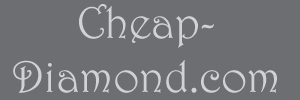
 | Jewelry takes people's minds off your wrinkles. - Sonja Henie |
Diamond Cuts
CutThe term “cut” does not signify a diamond’s “shape.” It is rather the attempt of the artisan to make the best use of light. The cut unlocks the diamond's hidden beauty and is the result of a skilled and talented diamond cutter. The depth, width and uniformity of its facets determine the brilliance, durability and beauty that we look for in a diamond. The sparkle that diamonds are famous for comes from the proportions of the cut. This can result in a more expensive diamond than one of the same clarity and color but of a poorer cut. However, people do not always agree because they have different tastes. Different patterns of cut also influence their desires. However, the majority of people agree that a diamond of a higher cut grade looks better than a diamond in a lower cut grade. The Gemological Institute of America (GIA), a non-profit institute dedicated to research and education in the field of gemology, uses the following guidelines for grading cut.
Types of CutsThere are two types of cuts: The Step Cut and the Brilliant Cut. The difference between them is the number of facets in each cut. A facet is the plain polished flat surface on a diamond. A 58-faceted diamond will have 58 surfaces cut and polished into it. The Step Cut got its name because it resembles the steps of a staircase.
A variant of the Step Cut is the Emerald Cut, which has rounded-off facets in the corners.
The Round Brilliant Cut is the attempt to cut a diamond into the best proportions to achieve maximum brilliance. Round diamonds are the most popular. They are also the most expensive cut because it allows the cutter to retain the most weight of the diamond. It has triangular facets that surround the stone and usually terminate on a flat top called a table. This cut has 58 triangular facets, 33 are above the middle of the stone and 25 are below.
Shapes
Shape is a matter of personal preference. Round is, of course, the most traditional, but there are many other shapes to choose from. The eight most common shapes are shown below.
|
|||||||||||||||||||||||||||||||||||||||||
|
Home
Diamond Grading
Man Made Diamonds
Synthetic Diamonds
Diamond Cuts
The Hope Diamond
Diamond Glossary
Diamond Countries
De Beers
Symbols, Culture
Diamond Book
Contact Us Tell Us About A Broken Link |
  
All About Diamonds |
||||||||||||||||||||||||||||||||||||||||
| Cheap-Diamond.com |
Site Map |
Terms of Use |
Privacy & Security |
Contact Us |
Purchase Agreement |
Send Feedback |